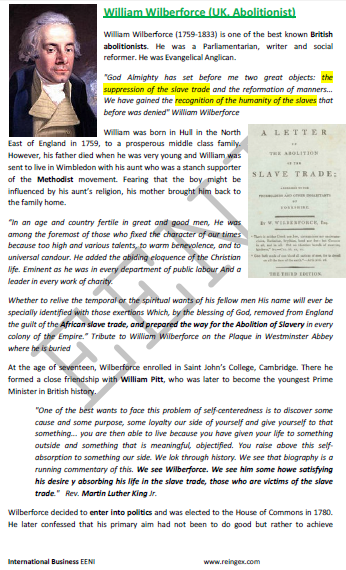William Wilberforce (British Abolitionist)
The crucial role of William Wilberforce in the struggle against slavery
The Abolitionist, Writer, and Member of the British Parliament William Wilberforce was born in 1759 in Hull United Kingdom - Europe); he died in 1833. Began his fight for abolition of slave trade and Slavery

“We had gained the recognition of Humanity of slaves that before was denied” William Wilberforce.
- William Wilberforce (Anglican, British, Abolitionist)
- The crucial role of William Wilberforce in struggle against slavery
Sample - The British Abolitionist William Wilberforce (slave trade)


Religions and Global Business -
Religious diversity

The Subject “William Wilberforce (British Abolitionist)” is included within the curriculum of the following academic programs at EENI Global Business School:

Doctorate in African Business, Ethics, Religions & Business.

Languages:  or
or  William Wilberforce
William Wilberforce  William Wilberforce
William Wilberforce  William Wilberforce.
William Wilberforce.
William Wilberforce (British Abolitionist).
- William Wilberforce was friend of William Pitt (first ministry and Abolitionist)
- In 1780, William Wilberforce was elected Member of the House of Commons
- Conversion to Evangelic (Anglicanism) Christianity in 1784
- Abolitionist Proposition Act (1789), accepted in 1807
- Prohibition of illegal Slavery in the British ships
- In 1823, William Wilberforce published “Call to religion, justice, and humanity of inhabitants of the British Empire in favor for black slaves in the West Indies”
- Abolition of Slavery throughout the British Empire: 1833
(c) EENI Global Business School (1995-2025)
Top of this page









 WhatsApp
WhatsApp
